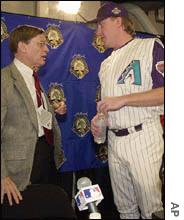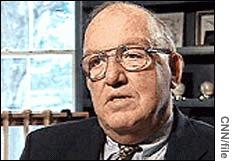|
Baseball's classic fall
|
 |
November 2, 2001: 6:53 p.m. ET
Players and owners could be on the verge of undoing a great season.
A twice-weekly column by Chris Isadore
|
NEW YORK (CNNmoney) - They are the unchallenged champions of baseball, winning year after year, even as many fans are certain they represent all that is wrong with the national pastime.
This fall they face the greatest challenge in recent memory. Still, any critic who counts them out is risking another disappointment.
No, I'm not talking about the New York Yankees, the three-time defending champs in the midst of an exciting World Series with the upstart Arizona Diamondbacks.
It's the Major League Baseball Players Association, perhaps the nation's most successful union of the past 30 years and an organization with a winning record that makes the Yanks look more like the Chicago Cubs.

|
|
|
Baseball Commissioner Bud Selig, shown here with Arizona Diamondbacks pitcher Curt Schilling, is preparing to lead owners into a new round of talks with the players union. | |
The union's low regard stems from the fact that every labor contract expiration since 1972 has been followed by a work stoppage, the last of which was a strike that wiped out the 1994 postseason.
Next week the league's collective bargaining agreement - reached after the 1994 strike - expires. While most fans have been enjoying the postseason, that could be just a calm before yet another perfect storm.
The players union has almost always had the upper hand. It has changed the face of baseball since the late 1960s, delivering to its members free agency and binding salary arbitration, raising the average salary to $1.9 million last year, from $31,532 in 1971, the year before its first strike.
But now the owners are gearing up for a fight, and this time they think they've got a chance. "They (ownership) don't think there's any better time to do it," said one former baseball executive who spoke on the condition that his name not be used. "There are folks who are desperate to do something, and they think have a greater chance of getting an NBA-style deal this time around."
The owners are citing the financial losses and low attendance at some franchises as proof of the need to eliminate at least two of the teams. And the owners have a couple of key advantages as they enter the new negotiations.
First is Commissioner Bud Selig, a former owner himself. Selig has done the unprecedented job of keeping owners from airing any internal disputes in advance of the talks, or making saber-rattling comments, either of which could be used by the players union.
Plus, the owners think they've got the public support. Alex Rodriguez of the Texas Rangers signed a 10-year deal last year for an average of $25 million a year, a staggering sum which has galvanized the thinking that player salaries are out of control.
Are the owners really so strong?
There are those that doubt the owners' position.
Former Commissioner Fay Vincent, who was forced out in 1992 as ownership prepared for round of talks that eventually led to the sport's longest work stoppage, says that management has few additional advantages and all of the liabilities it took into past talks.
| |

|
|
Former baseball commissioner Fay Vincent doubts that baseball will be able to avoid yet another work stoppage. | |
"I think he (Selig) is probably better able to get support among owners," Vincent told me. "But they're trying to roll back 25 years of labor agreements in one round. I was telling them the best you can do is incremental improvement - it's going to take a long time to straighten out this. They didn't want to hear that."
Vincent also isn't optimistic of the game's chances of avoiding its ninth straight work stoppage.
"I don't think Bud wants a major confrontation. On other hand he wants major changes, and that's going to lead to a major confrontation," said Vincent. "The union is very well run. They win all the legal fights and baseball has to fold. There isn't much history that says the owners have a very good chance."
Under the last contract the union won an end to the league's antitrust exemption as it relates to labor relations, which gives the union even greater legal leverage than it had in the past.
There are those who believe that leverage may actually be enough to let the players avoid using the weapon of a strike this time around, depending on the courts to back it up instead. They say both sides are aware of the damage done to the sport in 1994 and 1995, and because of that they will be able to reach an agreement without a war this time around.
Click here for CNNSI.com's coverage of major league baseball
"It seems to me what necessarily has to happen is some concessions from both sides. Whether that is a victory for owners or victory for players, I'm not sure," said Andrew Zimbalist, professor of economics at Smith College and author of a book on the game's economics, "Baseball and Billions."
"I think they will have to be some greater revenue sharing, reinstitution of a salary tax," Zimbalist said. "But I don't think the big-market owners will agree to everything the smaller clubs want. I'm not sure Bud has got more of a whip than he had in the past. Just because he's been able to keep owners from talking under threat of a fine doesn't mean when they sit behind closed doors, they lie down for him."
Baseball is ending its season with on field accomplishments that have dazzled its fans. If it goes from that high point to yet another ugly clash between billionaire owners and millionaire players, it will be the worst blown lead in the game's history, this week's World Series games notwithstanding. 
|
|
|
|
|
|

|

